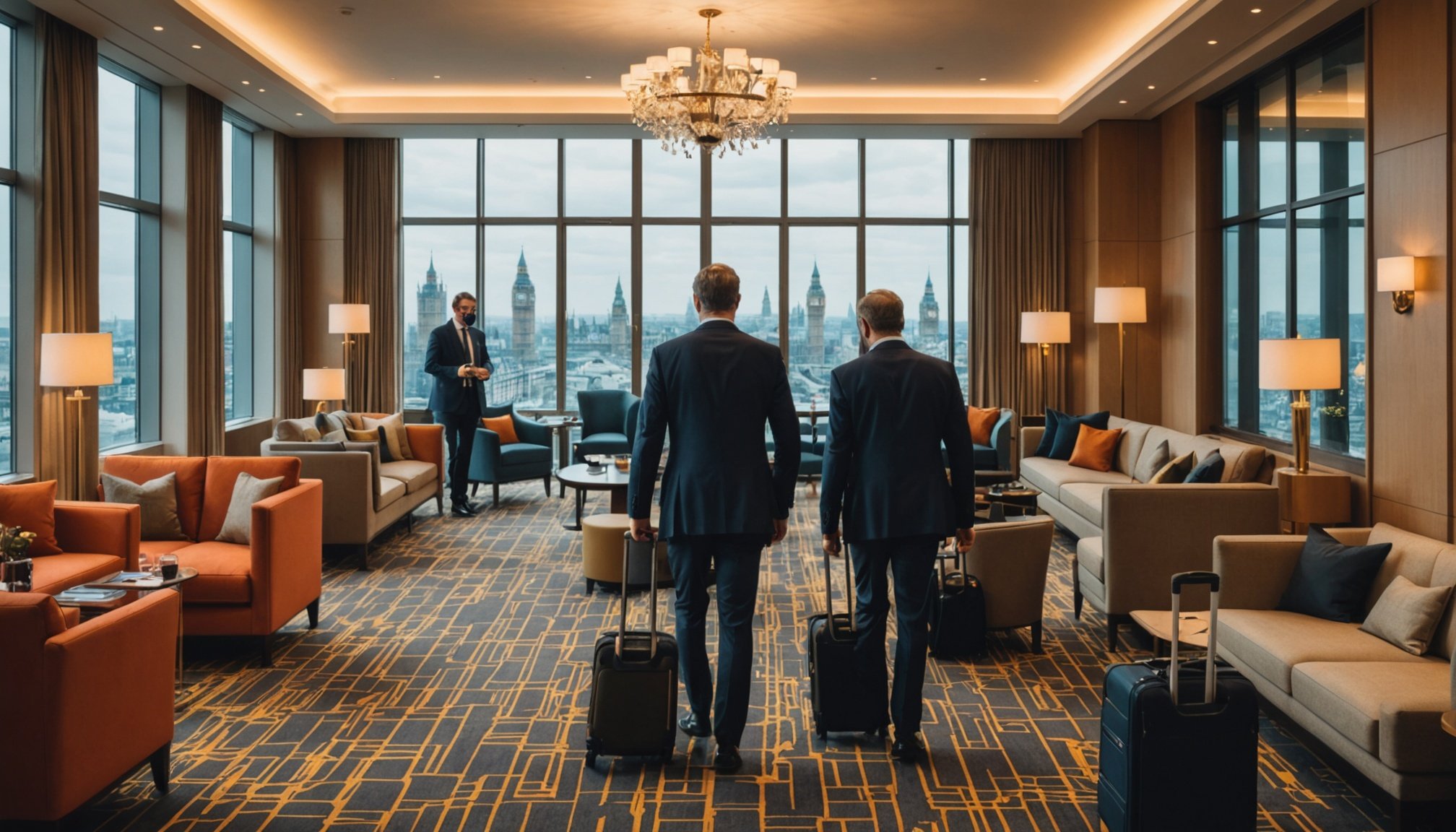Understanding the Post-Pandemic Business Traveler
In the wake of the pandemic, business travel behavior experienced significant changes, reshaping the entire landscape. Post-pandemic travel trends now highlight an increased preference for remote work flexibility, which influences booking patterns. Business travelers are prioritising health safety measures as an essential part of their travel decisions.
The key preferences of business travelers have evolved, with a stronger focus on flexible cancellation policies, robust digital connectivity, and spaces that support hybrid work models. Furthermore, the demand for personalised services has surged, as business travelers seek experiences that cater specifically to their unique needs and schedules.
Also read : Mastering GDPR: Essential Compliance Tactics for Thriving UK E-Commerce Ventures
Understanding these shifting market insights is crucial for hotels looking to adapt and thrive. Hotels must analyse these preferences to adjust their offerings accordingly, ensuring competitiveness in the current market. This involves aligning services with market demands, such as integrating health and safety protocols, offering flexible booking options, and enhancing technological capabilities. These insights help in anticipating the needs of business travelers, ultimately leading to increased satisfaction and loyalty.
Safety Protocols as a Fundamental Tactic
In the post-pandemic landscape, Health and Safety Standards have become more crucial than ever for hotels. Enhanced Sanitation Practices are now implemented, focusing on deep cleaning of common areas and individual rooms. Contactless technology, such as mobile check-ins and digital room keys, is integral to ensuring guest confidence and safety. For example, Marriott International introduced advanced cleaning technologies, including electrostatic sprayers and air purifiers, to further reassure guests.
Additional reading : Empowering UK Innovators: Maximizing Government Grants for Tech Success;202Empowering UK Financial Advisors: How Data Analytics Revolutionizes Client Services
Guest confidence hinges on visible dedication to hygiene; thus, many hotels have gone beyond traditional cleaning routines. Staff training programs focusing on health protocols ensure high safety levels are maintained consistently. These practices not only protect guests but also instill a sense of security, encouraging repeat bookings.
Some hotels, like Hilton, have partnered with renowned health organisations to certify their sanitation protocols, reflecting commitment to guest well-being. As travel restarts, prioritisation of health standards helps hotels stand out in a competitive market. By adopting robust safety measures, hotels can attract cautious travelers and build long-term guest confidence.
Flexible Booking Options to Attract Travelers
In a world marked by travel uncertainty, the significance of flexible booking policies cannot be overstated. Business travelers, prioritising adaptability, view these policies as vital to their planning. Hotels that offer generous cancellation options are not only attracting more guests but also fostering loyalty. These policies often involve allowing cancellations without penalties, rescheduling without fees, and even room price adjustments as travel plans fluctuate.
Successful initiatives, such as Marriott’s “Flexible Booking Rates,” exemplify how flexibility can boost hotel bookings. This approach enhances traveler loyalty, as guests appreciate the peace of mind that comes with the option to alter reservations effortlessly. Furthermore, adaptation to uncertain travel conditions helps improve hotels’ market positioning.
Consequently, flexibility transforms initial traveler hesitancy into confidence, leading to increased bookings. By incorporating flexible options, hotels efficiently cater to the evolving needs of post-pandemic business travel dynamics. Such adaptability is crucial in maintaining competitiveness and establishing long-term relationships with business travelers.
Tailored Services and Amenities for Business Travelers
Today’s business traveler values personalized services, seeking accommodations that cater specifically to their needs. The essentials, such as high-speed Wi-Fi and adaptable meeting spaces, are non-negotiable. These business amenities ensure a productive environment, regardless of the traveler’s location.
Customization extends beyond basics: hotels can enhance the guest experience by offering convenient transport options, laundry services, and healthy dining choices tailored to individual preferences. This is where personalized services become a defining factor. By embracing technology, hotels also provide guests with app-based services for seamless stays, like easily booked meeting rooms and on-demand concierge services, meeting the fast-paced needs of business travelers.
Success stories abound, with hotels reporting increased satisfaction and repeat stays when services align with traveler needs. For example, some have integrated innovative wellness programs into their offerings, understanding that a balanced stay improves guest productivity and satisfaction. These tailored experiences differentiate a hotel in a competitive market, emphasizing the importance of understanding and exceeding business travelers’ expectations.
Technological Enhancements in Hotel Services
In today’s competitive hospitality landscape, technology integration is indispensable for offering exceptional guest experiences. Digital solutions, such as mobile apps, streamline the booking process and facilitate quick communication between guests and hotel staff. This ensures guest engagement by allowing travelers to customize their stays with ease.
Smart room technology is another significant innovation, providing features like adaptive lighting, climate control, and voice-activated assistants. These enhancements cater to business efficiency by enabling a more comfortable and productive environment for travelers. By integrating technology seamlessly into hotel operations, businesses can streamline services and enhance guest convenience.
Numerous hotels have successfully leveraged these technologies to improve service. For instance, implementing digital check-in and check-out services reduces wait times, enhancing overall guest satisfaction. These technological tools not only elevate the guest experience but also position hotels at the forefront of modern hospitality standards. As business travelers increasingly rely on digital conveniences, hotels that prioritize technology are better equipped to meet their evolving needs and foster lasting guest loyalty.
Marketing Strategies to Reach Business Travelers
Post-pandemic, targeted marketing is essential to attract business travelers whose needs have shifted significantly. Hotels must adapt by creating branding strategies that reflect the unique preferences of these travelers. Utilising data-driven insights to craft personalised promotions can effectively capture their attention.
An effective strategy involves leveraging digital platforms for maximum reach. A strong online presence is crucial, as business travelers frequently rely on digital channels to plan their trips. Targeted advertisements on social media and travel sites can directly engage this audience, particularly when integrated with interactive and personalised content.
Business travel promotions must highlight aspects like flexible booking, enhanced safety protocols, and tailored amenities. Successful case studies include hotels that have partnered with corporate travel programs, offering exclusive deals and rewards. These initiatives not only elevate the brand’s visibility but also build loyalty among business travelers.
A hotel’s marketing strategy should continually adapt, using feedback and results from campaigns to refine approaches. In a competitive market, maintaining a dynamic and responsive marketing plan ensures sustained relevance and draws in discerning business travelers looking for accommodating, reliable services.
Analyzing the Impact of Business Traveler Needs on Hotel Operations
Adjustments in operational changes have become essential as hotels react to the renewed demands of today’s business travelers. The pandemic has significantly influenced this landscape, resulting in hotels revising their strategies to accommodate shifting priorities. A critical element involves a robust method for gathering customer feedback, which allows for precise adaptations to service offerings.
To effectively meet evolving needs, hotels are increasingly leveraging feedback tools such as surveys, social media interactions, and real-time reviews. This information is vital for understanding and anticipating guest preferences, enabling timely service adaptation. As a result, hotels are placing a heightened focus on personalisation, wellness, and technological integration.
Adjustments include introducing hybrid spaces that cater to both work and leisure, ensuring that business amenities such as high-speed connectivity are consistently available. This proactive approach not only enhances guest satisfaction but also fosters loyalty and repeat business. By refining services based on the detailed expectations of modern business travelers, hotels can maintain a competitive advantage in a dynamic market. Ultimately, the ability to adapt operations and meet emerging requirements is pivotal to achieving success in the post-pandemic era.
Analyzing the Impact of Business Traveler Needs on Hotel Operations
As the landscape of business travel evolves post-pandemic, hotels are adapting their operational strategies to align with new traveler preferences. Feedback from business travelers is central to these adjustments, highlighting the importance of customer feedback mechanisms. Such data helps hotels adapt services by identifying gaps and opportunities in guest experiences.
Hotels are now focused on evolving their amenities to support the dual needs of work and relaxation, reflecting a shift towards hybrid workspaces. Enhanced business amenities, like reliable high-speed internet, are becoming essential as travelers expect seamless connectivity for work. Hotels must adopt real-time review systems and feedback apps to gather valuable insights into guest experiences, enabling proactive service enhancements.
Additional changes include prioritising wellness and personalisation within hotel offerings. By catering to specific guest preferences, hotels increase satisfaction and foster loyalty. The ability to adapt operations efficiently as market demands evolve not only enhances guest experiences but also positions hotels favourably in a competitive environment. Success lies in understanding and exceeding modern business traveler expectations through strategic operational shifts.











